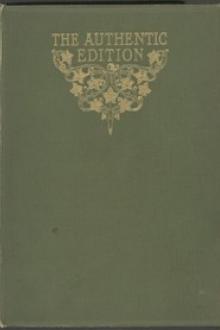The Clicking of Cuthbert by P. G. Wodehouse (acx book reading TXT) 📗

- Author: P. G. Wodehouse
Book online «The Clicking of Cuthbert by P. G. Wodehouse (acx book reading TXT) 📗». Author P. G. Wodehouse
He was not altogether unprepared for such an attitude on the young man's part: for from his eyrie on the terrace above the ninth green he had observed him start out on the afternoon's round and had seen him lose a couple of balls in the lake at the second hole after taking seven strokes at the first.
"Yes!" cried the young man fiercely. "For ever, dammit! Footling game! Blanked infernal fat-headed silly ass of a game! Nothing but a waste of time."
The Sage winced.
"Don't say that, my boy."
"But I do say it. What earthly good is golf? Life is stern and life is earnest. We live in a practical age. All round us we see foreign competition making itself unpleasant. And we spend our time playing golf! What do we get out of it? Is golf any use? That's what I'm asking you. Can you name me a single case where devotion to this pestilential pastime has done a man any practical good?"
The Sage smiled gently.
"I could name a thousand."
"One will do."
"I will select," said the Sage, "from the innumerable memories that rush to my mind, the story of Cuthbert Banks."
"Never heard of him."
"Be of good cheer," said the Oldest Member. "You are going to hear of him now."
It was in the picturesque little settlement of Wood Hills (said the Oldest Member) that the incidents occurred which I am about to relate. Even if you have never been in Wood Hills, that suburban paradise is probably familiar to you by name. Situated at a convenient distance from the city, it combines in a notable manner the advantages of town life with the pleasant surroundings and healthful air of the country. Its inhabitants live in commodious houses, standing in their own grounds, and enjoy so many luxuries—such as gravel soil, main drainage, electric light, telephone, baths (h. and c.), and company's own water, that you might be pardoned for imagining life to be so ideal for them that no possible improvement could be added to their lot. Mrs. Willoughby Smethurst was under no such delusion. What Wood Hills needed to make it perfect, she realized, was Culture. Material comforts are all very well, but, if the summum bonum is to be achieved, the Soul also demands a look in, and it was Mrs. Smethurst's unfaltering resolve that never while she had her strength should the Soul be handed the loser's end. It was her intention to make Wood Hills a centre of all that was most cultivated and refined, and, golly! how she had succeeded. Under her presidency the Wood Hills Literary and Debating Society had tripled its membership.
But there is always a fly in the ointment, a caterpillar in the salad. The local golf club, an institution to which Mrs. Smethurst strongly objected, had also tripled its membership; and the division of the community into two rival camps, the Golfers and the Cultured, had become more marked than ever. This division, always acute, had attained now to the dimensions of a Schism. The rival sects treated one another with a cold hostility.
Unfortunate episodes came to widen the breach. Mrs. Smethurst's house adjoined the links, standing to the right of the fourth tee: and, as the Literary Society was in the habit of entertaining visiting lecturers, many a golfer had foozled his drive owing to sudden loud outbursts of applause coinciding with his down-swing. And not long before this story opens a sliced ball, whizzing in at the open window, had come within an ace of incapacitating Raymond Parsloe Devine, the rising young novelist (who rose at that moment a clear foot and a half) from any further exercise of his art. Two inches, indeed, to the right and Raymond must inevitably have handed in his dinner-pail.
To make matters worse, a ring at the front-door bell followed almost immediately, and the maid ushered in a young man of pleasing appearance in a sweater and baggy knickerbockers who apologetically but firmly insisted on playing his ball where it lay, and, what with the shock of the lecturer's narrow escape and the spectacle of the intruder standing on the table and working away with a niblick, the afternoon's session had to be classed as a complete frost. Mr. Devine's determination, from which no argument could swerve him, to deliver the rest of his lecture in the coal-cellar gave the meeting a jolt from which it never recovered.
I have dwelt upon this incident, because it was the means of introducing Cuthbert Banks to Mrs. Smethurst's niece, Adeline. As Cuthbert, for it was he who had so nearly reduced the muster-roll of rising novelists by one, hopped down from the table after his stroke, he was suddenly aware that a beautiful girl was looking at him intently. As a matter of fact, everyone in the room was looking at him intently, none more so than Raymond Parsloe Devine, but none of the others were beautiful girls. Long as the members of Wood Hills Literary Society were on brain, they were short on looks, and, to Cuthbert's excited eye, Adeline Smethurst stood out like a jewel in a pile of coke.
He had never seen her before, for she had only arrived at her aunt's house on the previous day, but he was perfectly certain that life, even when lived in the midst of gravel soil, main drainage, and company's own water, was going to be a pretty poor affair if he did not see her again. Yes, Cuthbert was in love: and it is interesting to record, as showing the effect of the tender emotion on a man's game, that twenty minutes after he had met Adeline he did the short eleventh in one, and as near as a toucher got a three on the four-hundred-yard twelfth.
I will skip lightly over the intermediate stages of Cuthbert's courtship and come to the moment when—at the annual ball in aid of the local Cottage Hospital, the only occasion during the year on which the lion, so to speak, lay down with the lamb, and the Golfers and the Cultured met on terms of easy comradeship, their differences temporarily laid aside—he proposed to Adeline and was badly stymied.
That fair, soulful girl could not see him with a spy-glass.
"Mr. Banks," she said, "I will speak frankly."
"Charge right ahead," assented Cuthbert.
"Deeply sensible as I am of——"
"I know. Of the honour and the compliment and all that. But, passing lightly over all that guff, what seems to be the trouble? I love you to distraction——"
"Love is not everything."
"You're wrong," said Cuthbert, earnestly. "You're right off it. Love——" And he was about to dilate on the theme when she interrupted him.
"I am a girl of ambition."
"And very nice, too," said Cuthbert.
"I am a girl of ambition," repeated Adeline, "and I realize that the fulfilment of my ambitions must come through my husband. I am very ordinary myself——"
"What!" cried Cuthbert. "You ordinary? Why, you are a pearl among women, the queen of your sex. You can't have been looking in a glass lately. You stand alone. Simply alone. You make the rest look like battered repaints."





Comments (0)